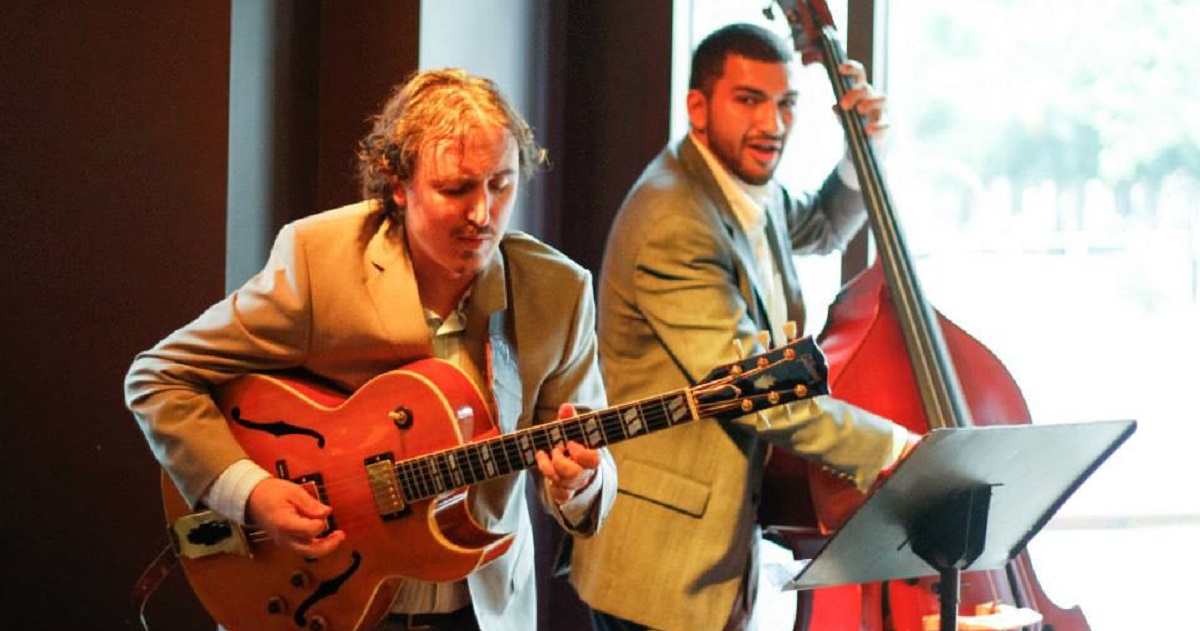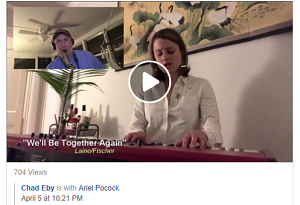
Missing the Power of the Music
April, 2020 –Local jazz pianist Lovell Bradford recalls an evening waiting for his paycheck after a gig at Gilly’s, a club he played in Dayton. “I sat down at the piano, and started to play, Somewhere Over the Rainbow. It was just me and the cleaning crew, turning off the lights. I must have played five minutes or so, not thinking anyone was paying attention, didn’t give any kind of grand ending. A woman, still sitting in the back of the room, made her way to stage. ‘Think you so much for that. You have helped me along a stretch in my life.’ As she handed over $50, she explained that Somewhere Over the Rainbow was the song she and her husband fell in love over. He had passed away earlier that year. “
This shows how powerful music is. What a tool for healing it can be. “We hear applause, but we don’t often know how music affects the listener, soothing so many underlining issues we all carry from day to day. Musicians underestimate the power of the music we play. “
Chad Eby describes his feelings about this pandemic: “You know when the Tsunami hit Japan and those videos showed the water coming in, seeming slowly? I feel like that right now. We see it coming, but there is nothing that can be done and we aren’t sure doing what we are supposed to do. The hardest part for me is the loss of social and spiritual and emotional contact, working with my friends and making music we love and sharing with people who value it. “
But there are certainly also very substantive impacts for musicians. “The loss of income was immediate,” shares Dawn Anthony, a performer and teacher. “A full-time jazz musician has been all but rendered helpless,” states Lovell. Most musicians have not performed in weeks, already. Many are in fact two-person creative households, meaning all breadwinners are cut off from their source of income. Many of the more seasoned musicians are acoustic – technology is a challenge they are not able to turn to with ease. Add to that, many instruments like drums, bass and even trumpet or vocals, don’t lend themselves to solo work and suffer from social distancing limitations. Even when musicians are willing, so many have older or younger family members they don’t want to put at risk. Musicians even worry that, when this is over, will the venues and support organizations weather the storm.
Yes, there are technologies that can bridge some gaps. But sound quality issues and the lack of the person-to-person connection waters down these attempts to fill a need for music for all of us. Lovell points out that while he has found software and equipment to help, you have to make an investment. “The choice right now is to purchase that or toilet paper.”
For now, musicians are doing whatever they are able.
Chad Eby, JAZZ ROOM musician and UNC Greensboro instructor, is preparing for projects that he has no idea when might come to fruition. “I’m spending a lot of time right now on a deep dive into lesser known repertoire of the impressive French composer Michel Legrand. I’m working on some big band arrangements that I was having a hard time carving space for, considering the Christmas concert music a little early, transcribing solos. I’m doing some much needed maintenance technical practice on the saxophone which had taken a back burner. Basically, embracing the opportunity to better myself.”
 “Video streams are an attempt to get out the music within us. An outlet,” explains Lovell. “A way we can show listeners our humanity right now. For everyone facing the strained of quarantine, it’s a way to flood social media with some beauty.”
“Video streams are an attempt to get out the music within us. An outlet,” explains Lovell. “A way we can show listeners our humanity right now. For everyone facing the strained of quarantine, it’s a way to flood social media with some beauty.”
Reconciling the musician’s desire to strive for quality with all these constraints, Dawn believes people will be accepting of what musicians are able to offer because they know the situation. “It’s not the audience, it’s the sharing. And in return, listeners just want to offer support.”
Dawn also cautions that “a lot of us won’t ask.” As an example, she tells her concern for a prominent 1980s old school musician who only takes payment in cash. “I am worried. I think he has need, and won’t want to ask.”
It is these local musicians we need to keep on our minds in times of isolation. As representatives, Chad, Dawn and Lovell have some ideas for how we can help this community, if we are able.
“Seek out musicians you have enjoyed in the past. Dig into their work, follow them on social media, and listen to their music, share what you find,” asks Lovell.
“If you’re seeking a way to keep a connection to the music, seek it online,” suggests Chad. “Maybe a family that tends to go out can turn that into a weekly date night to stream a concert instead. If you put on a video of an artist, do a deep dive on an archived performance, with some research on who the people in the band are. Do it up, with dinner, drinks, and your screen. Clap for the solos. Find ways to make a connection.”
Dawn suggests you tell them your appreciation, and show it when you can. Let local musicians know they are valued. Make sure others know about them. “If you have it to burn,” says Chad, “consider making a donation in the amount you would have spent on ticket sales. Or perhaps ask what they need.”
The musicians know their audience may also have nothing to pay right now. So, Lovell urges, “when we can get out of the house again, be sure to go to a jazz performance.”
“We’ve got to rise up through this together. The listener has some responsibility in that. We can no longer show up out of convenience. We must be intentional about supporting the artists. “
Music is a communal experience. It requires the musicians, an audience, plus all the people in the support system around it, from venues to ticket takers. “In particular, jazz is by, of, and for the community,” summarizes Chad.
And art will still be needed when this is over.
NOTE: Follow @thejazzarts on Facebook, Twitter, or Instagram for ideas on how to stay connected, educated, and entertained.